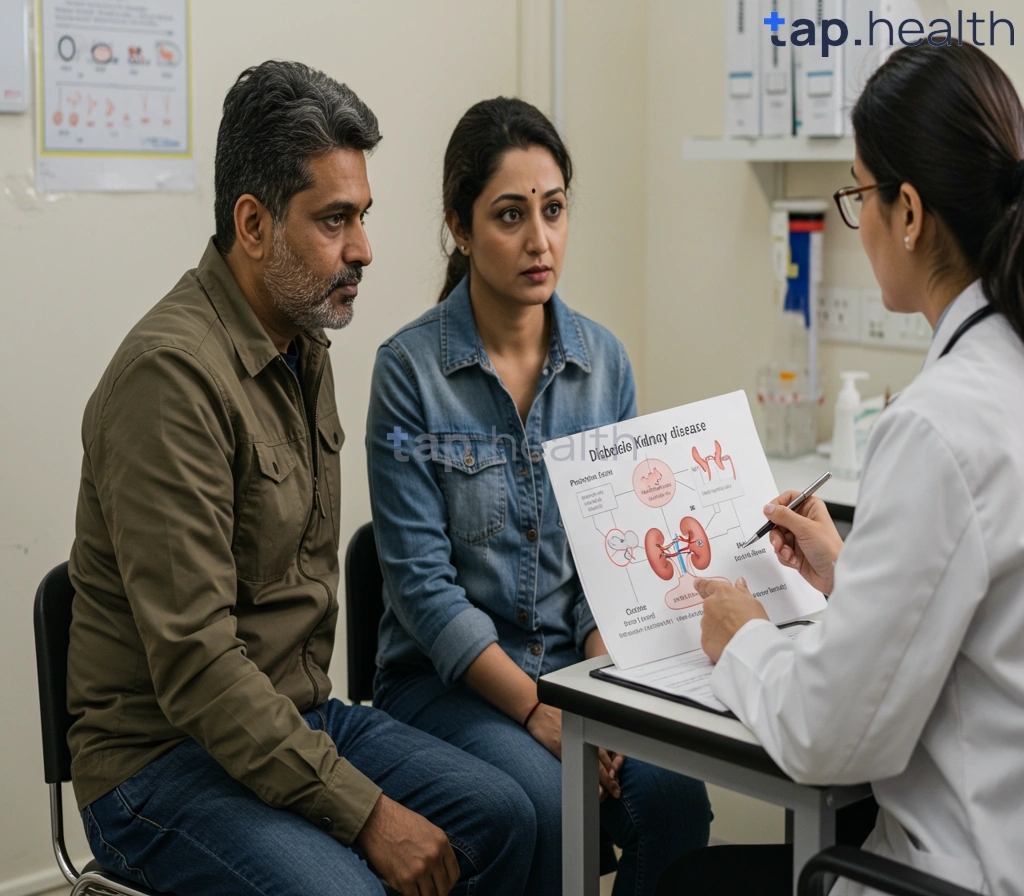Table of Contents
- Understanding the Diabetes-CKD Connection
- Diabetes and Kidney Disease: A Complete Guide
- How Chronic Kidney Disease Affects Diabetics?
- Preventing Kidney Damage in People with Diabetes
- Managing Diabetes to Protect Kidney Health
- Frequently Asked Questions
- References
Living with diabetes can present many challenges, and one of the most serious long-term complications is chronic kidney disease (CKD). Understanding the connection between these two conditions is crucial for effective management and improving your overall health. This blog post, Understanding Diabetes and Chronic Kidney Disease: A Comprehensive Overview, will explore the intricate relationship between diabetes and CKD, explaining how one affects the other and outlining strategies for prevention and treatment. We’ll delve into the risk factors, symptoms, and latest advancements in managing both conditions, empowering you with the knowledge you need to take control of your well-being. Let’s get started!
Understanding the Diabetes-CKD Connection
Diabetes significantly increases your risk of developing chronic kidney disease (CKD), also known as diabetic nephropathy. This is a serious complication where the kidneys are damaged due to high blood sugar levels. Nearly 30% of people with diabetes develop diabetic nephropathy, highlighting the critical need for proactive management. This connection is particularly relevant in Indian and tropical countries where diabetes prevalence is rising. Early detection and management are crucial to slowing or preventing kidney damage.
Understanding the Risk Factors
Several factors contribute to the development of CKD in individuals with diabetes. Poorly controlled blood sugar levels are the primary culprit, leading to damage of the tiny blood vessels (glomeruli) in the kidneys responsible for filtering waste. High blood pressure, another common complication of diabetes, further strains these delicate structures. In tropical climates, factors like dehydration and certain dietary habits can exacerbate these risks. Regular monitoring of blood glucose, blood pressure, and kidney function is vital. The link between Understanding the Link Between Diabetes and Obesity is also a critical factor to consider, as obesity often contributes to poor blood sugar control.
Taking Control: Actionable Steps
Managing diabetes effectively is the best way to protect your kidneys. This includes maintaining healthy blood sugar levels through diet, exercise, and medication as prescribed. Regular check-ups with your doctor are essential for early detection of any kidney damage. In India and other tropical regions, specific dietary considerations, such as reducing salt intake and incorporating kidney-friendly foods, can be highly beneficial. Don’t hesitate to seek expert advice from a nephrologist or diabetologist for tailored guidance and support. Early intervention significantly improves the prognosis and quality of life. For a deeper understanding of the advanced stages of kidney disease, please see our article on Understanding Stage 5 Chronic Kidney Disease (CKD).
Diabetes and Kidney Disease: A Complete Guide
Diabetes significantly increases the risk of developing chronic kidney disease (CKD), a serious condition affecting millions globally. This is particularly concerning in India and other tropical countries, where diabetes prevalence is high. Statistics reveal that a substantial portion of the diabetic population, 61% of those aged 20-64 years and 39% of those 65+, are at risk. Early detection and management are crucial.
Understanding the Link
High blood sugar levels damage blood vessels, including those in the kidneys. This damage reduces the kidneys’ ability to filter waste and excess fluid from the blood, leading to CKD. Symptoms can be subtle initially, making early diagnosis challenging. In tropical climates, pre-existing conditions and lifestyle factors can exacerbate this risk. Regular check-ups are essential for those with diabetes, especially in high-risk populations.
Protecting Your Kidneys
Managing diabetes effectively is key to preventing or slowing CKD progression. This includes maintaining healthy blood sugar levels through diet, exercise, and medication as prescribed by your doctor. Regular blood pressure monitoring and control are also vital, as hypertension further stresses the kidneys. Furthermore, staying hydrated and managing your weight can help reduce the strain on your kidneys. As you age, managing diabetes becomes increasingly complex, so it’s helpful to understand the Managing Diabetes as You Age: Challenges and Solutions.
Seeking Help in India and Tropical Countries
Access to quality healthcare is paramount. In India and other tropical regions, seeking advice from a nephrologist or diabetes specialist is crucial for early detection and personalized management. Early intervention significantly improves outcomes and quality of life. Don’t delay – take proactive steps to safeguard your kidney health. Schedule a checkup today. If you’re planning any travel, be sure to check out our guide on Traveling with Diabetes: Essential Tips for a Safe & Healthy Journey to ensure your diabetes management remains consistent.
How Chronic Kidney Disease Affects Diabetics?
Diabetes significantly increases the risk of developing chronic kidney disease (CKD), a condition where the kidneys gradually lose their ability to filter waste and excess fluid from the blood. This is because high blood sugar levels, a hallmark of diabetes, damage the tiny blood vessels in the kidneys over time, impairing their function. This damage can lead to a range of complications, including proteinuria (protein in the urine), hypertension, and ultimately kidney failure. The prevalence of this is particularly concerning in Indian and tropical countries where diabetes rates are rising.
Understanding the Connection
The link between diabetes and CKD is complex but well-established. High blood sugar damages the glomeruli, the filtering units of the kidneys. This leads to decreased kidney function, often progressing silently for years before symptoms appear. Early detection is crucial, especially considering that smokers with diabetes face a two-fold higher mortality rate due to cardiovascular issues, which are often linked to CKD. This emphasizes the need for proactive screening and management, particularly within high-risk populations in India and other tropical regions.
Managing the Risk
Effective diabetes management is key to preventing or slowing the progression of CKD. This includes maintaining healthy blood sugar levels through diet, exercise, and medication; managing blood pressure; and controlling cholesterol. Regular check-ups with a nephrologist (kidney specialist) are also vital for early detection and intervention. Seek regular kidney function tests, including eGFR (estimated glomerular filtration rate) and urine protein levels, as part of your routine diabetic care. In India and other tropical regions, access to affordable healthcare and awareness campaigns are paramount in combating this growing health challenge. Don’t delay; prioritize your kidney health today. Choosing the right medication is also important, and you might find our article on Which Diabetes Drug is Best for Diabetics with Kidney Disease? helpful. It’s also important to understand the potential long-term implications; you can read more about this in our article on Is Chronic Kidney Disease a Disability?.
Preventing Kidney Damage in People with Diabetes
Diabetes significantly increases the risk of developing chronic kidney disease (CKD), a serious complication affecting millions globally, especially in regions like India and other tropical countries. Over 60% of people with diabetes in India also have hypertension, a major risk factor for CKD progression. This alarming statistic highlights the urgent need for proactive measures to protect kidney health. Understanding the link between diabetes and kidney damage is crucial for effective prevention.
Managing Blood Sugar and Blood Pressure
The cornerstone of preventing diabetic kidney disease is strict blood sugar control. Regular monitoring of blood glucose levels, coupled with medication and lifestyle modifications like a balanced diet and regular exercise, are essential. Equally crucial is managing hypertension. Keeping blood pressure within the recommended range significantly reduces the strain on the kidneys. This often involves medication and lifestyle changes similar to those for blood sugar management.
Lifestyle Interventions: Key to Prevention
Beyond medication, adopting a healthy lifestyle plays a vital role. This includes maintaining a healthy weight, limiting salt intake, and reducing the consumption of processed foods and sugary drinks. Regular physical activity not only helps manage weight and blood pressure but also improves overall metabolic health, indirectly protecting the kidneys. In tropical climates, staying hydrated is especially important, helping the kidneys function optimally. For more information on preventing long-term complications, including those affecting the heart, check out our guide on How to Prevent Long-Term Complications of Diabetes: Easy Tips.
Regular Check-ups: Early Detection, Early Intervention
Regular check-ups with a healthcare professional are vital. Early detection of kidney damage through urine tests and blood tests (such as eGFR) allows for timely intervention, slowing down or preventing disease progression. Don’t underestimate the power of proactive healthcare; regular monitoring can significantly improve your long-term outlook. Taking charge of your health is the best way to prevent kidney complications associated with diabetes. Learning how to Protect Your Heart from Diabetes: 5 Essential Steps is also crucial, as cardiovascular health is closely linked to kidney function.
Managing Diabetes to Protect Kidney Health
Diabetes significantly increases the risk of developing chronic kidney disease (CKD), a serious complication affecting millions globally. This is particularly relevant in Indian and tropical countries where diabetes prevalence is high. Early detection and proactive management are crucial to prevent or slow CKD progression. Women, in particular, face a heightened risk; research indicates they have a 40% higher chance of heart disease compared to men with diabetes, highlighting the interconnectedness of these conditions and the importance of holistic care.
Controlling Blood Sugar Levels
Maintaining optimal blood glucose levels is paramount. This involves adhering to prescribed medication, following a balanced diet suitable for your region (emphasizing fresh fruits, vegetables, and whole grains), and regular physical activity. Regular monitoring of blood sugar levels through self-testing is also essential for effective management. Consistent management minimizes strain on the kidneys. For more comprehensive tips, check out our blog on 10 Proven Tips for Effective Diabetes Management.
Managing Blood Pressure
High blood pressure is another significant risk factor for CKD. Regular blood pressure monitoring and medication adherence, as directed by your doctor, are essential. Dietary changes, such as reducing salt intake, can also contribute to better blood pressure control. Managing cholesterol is also vital, as seen in our article on How to Manage Cholesterol Levels with Diabetes?.
Protecting Kidney Function
Beyond blood sugar and blood pressure, staying hydrated is crucial for kidney health. Consult your doctor about the appropriate fluid intake for your specific needs and climate, especially in hotter tropical regions. Regular check-ups including urine tests and blood tests (eGFR & creatinine levels) will help monitor kidney function and detect any issues early.
Taking proactive steps to manage diabetes is not just about controlling blood sugar; it’s about protecting your overall health, including your kidneys. Schedule a consultation with your doctor today to discuss a personalized diabetes management plan tailored to your individual needs and the specific challenges faced in your region.
Frequently Asked Questions on Diabetes & Kidney Disease | Comprehensive Overview
Q1. How does diabetes increase my risk of chronic kidney disease (CKD)?
High blood sugar damages the blood vessels in your kidneys, reducing their ability to filter waste. This damage can lead to CKD.
Q2. What are the early signs of diabetic kidney disease?
Early diabetic kidney disease often has subtle or no symptoms, making regular checkups crucial for early detection.
Q3. How can I manage my diabetes to protect my kidneys?
Effective management involves controlling blood sugar through diet, exercise, and medication; managing blood pressure and cholesterol; and regular checkups with a doctor.
Q4. What lifestyle changes can help prevent or slow CKD progression?
Maintaining a healthy lifestyle is vital. This includes proper hydration, reducing salt intake, and following your doctor’s recommendations for diet and exercise.
Q5. What specialists should I consult for managing diabetes and CKD?
It’s essential to work closely with both a diabetologist (diabetes specialist) and a nephrologist (kidney specialist) for personalized care and effective management.
References
- A Practical Guide to Integrated Type 2 Diabetes Care: https://www.hse.ie/eng/services/list/2/primarycare/east-coast-diabetes-service/management-of-type-2-diabetes/diabetes-and-pregnancy/icgp-guide-to-integrated-type-2.pdf
- Your Guide to Diabetes: Type 1 and Type 2: https://www.niddk.nih.gov/-/media/Files/Diabetes/YourGuide2Diabetes_508.pdf



